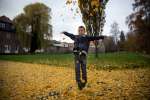- Text size
 |
|  |
|  |
| 
- عربي
UNHCR head Guterres urges massive EU response to help Greece attend to refugees
News Stories, 9 October 2015
GENEVA, Oct 9 (UNHCR) – UN High Commissioner for Refugees António Guterres today appealed to the European Union to provide "massive support" to Greece to meet the needs of up to 6,000 refugees arriving each day as winter looms across Europe.
He stressed that Greek authorities alone were not able to provide the investment needed to provide shelter, translators and experienced screeners to receive refugees fleeing wars in Syria and other countries, over 400,000 of whom have arrived in Greece by sea so far this year.
"There must be massive support by the European Union for Greece to be able to put in place this kind of capacity for the number of people that are coming," Guterres told a news conference in Geneva.
"This requires a comprehensive approach, and, let's be honest, a massive investment and sufficient staffing … for it to happen," he added.
Speaking at the close of the week-long annual meeting of UNHCR's high-level Executive Committee, he noted that the investment in funds and human resources needed to be of sufficient scale to create "meaningful capacity to receive and assist people" who are arriving in Greece at a rate of 5-6,000 a day.
"If the system is not powerful enough for the numbers coming, it will lack credibility and what will happen is that the people will go on moving by their own means. Today's chaotic situation is totally unacceptable, very risky and unsustainable."
"We know how to winterize a camp. We know how to winterize a tent. We know how to winterize a building. We don't know how to winterize a crowd moving every day from one country to another. It's impossible … With the kind of weather that you have in the Balkans, we could see this turn into a tragedy at any moment."
Guterres, who is to visit Greece to witness the situation at first hand this weekend, said there was no "easy way to control" the current situation unless a mechanism for support is provided at the place of arrival into Europe.
"We have been insisting on this for months … but this is not something that we can ask Greece to do by itself. It is only with a massive investment by the European Union that Greece will be able to do it. Leaving Greece on its own in a situation like this would be totally unacceptable"
The UNHCR's governing Executive Committee comprises representatives of more than 90 countries who meet in Geneva annually to review and approve the agency's programmes and budget. They also advise on international protection and discuss a wide range of other issues with UNHCR and its intergovernmental and non-governmental partners.
Guterres said the Committee approved a needs-based budget for 2016 of US $6.54 billion to cover the basic requirements of refugee emergencies worldwide. He expressed hope that more donors would allow their funds to be used flexibly in the year ahead instead of being earmarked for specific relief operations.
"When one sees todays' media reports … and one sees the political discussion and what occupies the international agenda, you see a lot of interest in Syria and very little on Central African Republic, so there is much more money coming to Syria and much less going to Central African Republic," he stressed.
He noted that, amid media attention, opportunities to resettle an additional 43,000 refugees, mainly Syrians, had been created just in the last few weeks. At the same time, an operation to assist more than 370,000 internally displaced people within strife-torn Central African Republic – together with 470,000 refugees in neighboring countries – has a deficit of $ 85 million dollars, which has to be covered with scarce un-earmarked funding.
"Our flexible funding is not enough to cover this and other underfunded African situations. We are really in a very dramatic situation to maintain our African operations without cutting the minimal levels of assistance that we … cannot cut."
"Is it possible that when people are coming, we say we are not going to help because we have no money? This is not sustainable; that is why it is so important to have more flexibility in the level of funding that we have."
By Tim Gaynor, Geneva










































